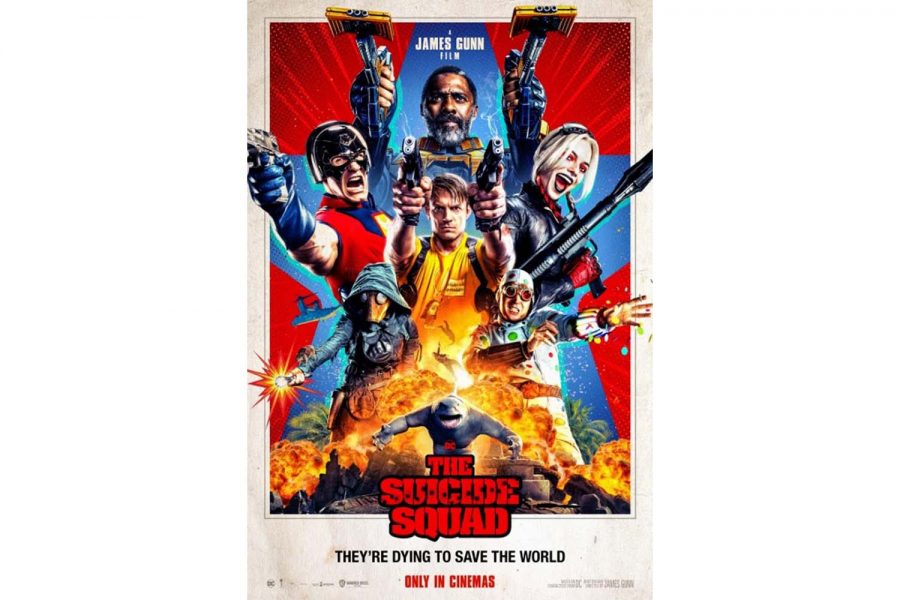Movie Review: The Suicide Squad
Although it shares the same name as the flop of a film from 2016, The Suicide Squad is nothing but a success.
August 30, 2021
Let it be known that The Suicide Squad is definitely not the same movie as Suicide Squad, even if it does share a few crucial plot points and cast members.
The newer film, which opened in theaters on Aug. 6, immediately demonstrated a massive improvement in quality from the 2016 version, and has been confirmed as neither a sequel nor a remake. Of course, this is to be expected from a film directed by James Gunn, also responsible for Marvel’s Guardians of the Galaxy franchise, which shares a similar comedic dramatism as The Suicide Squad.
The film follows the “B-team” of DC’s imprisoned supervillains tasked with protecting the United States from threats that the usual heroes can’t deal with. The ragtag team consists of Bloodsport, Peacemaker, Ratcatcher 2, King Shark, and Polka-Dot Man, and is later joined by Harley Quinn and Colonel Rick Flag. Directed by the slightly antagonistic Amanda Waller who can kill each of the villains with just a press of the button should they go off-task, the Suicide Squad must deal with a mysterious threat known as ‘Project Starfish,’ and save the U.S. from foreign conflict.
The Suicide Squad is nothing if not an example of how good writing, directing, and cinematography can emphasize an actor’s talents, rather than spotlight their weaknesses. The film shares several actors with its cinematic predecessor, including Margot Robbie as Harley Quinn, Viola Davis as Amanda Waller, and Joel Kinnaman as Rick Flag. Where their performances were emotionally dry at best and cringeworthy at worst in Suicide Squad, they more than redeemed themselves in the newer release.
Of course, the talents of Idris Elba as Bloodsport, Daniela Melchior as Ratcatcher 2, and unexpectedly, John Cena as Peacemaker, played an equal part in boosting the film to the next level. The overall emotional appeal that failed so miserably in Suicide Squad was executed incredibly well in this iteration of characters. Each character had a compelling, realistic backstory that led to a real bond being formed between the teammates, and not the rushed and confusing ‘found family’ trope that led to a cheesy semblance of emotion at the end of the 2016 film.
Another aspect that definitely contributed to this film’s success is its well-used R-rating. The fight scenes and action sequences really benefited from the realistically gruesome and bloody effects of supervillain conflict. It was a little jarring to see some characters swear so openly, but ultimately it felt a lot more natural for the murderous team to act like adults instead of poorly written caricatures dreamt up by 12-year-olds.
Along with the fight scenes, the film’s comedy also took a large step up. There are still a few jokes that fall flat or scenes that are a little tonally inconsistent with the subject matter, such as having Peacemaker, played by John Cena who usually takes more comedic roles, engage in a very emotionally charged life-or-death scene while wearing the character’s comically colorful getup. However, there were several times I laughed out loud at the cleverly written bits, whereas Suicide Squad’s only comedic value comes from laughing at The Joker’s terrible dialogue anytime he was on screen.
Ultimately, The Suicide Squad was an unexpectedly funny and even more unexpectedly emotional film that took mistakes from its predecessor, learned from them, and turned them into a film that will leave a prominent mark on DC’s cinematic universe.




